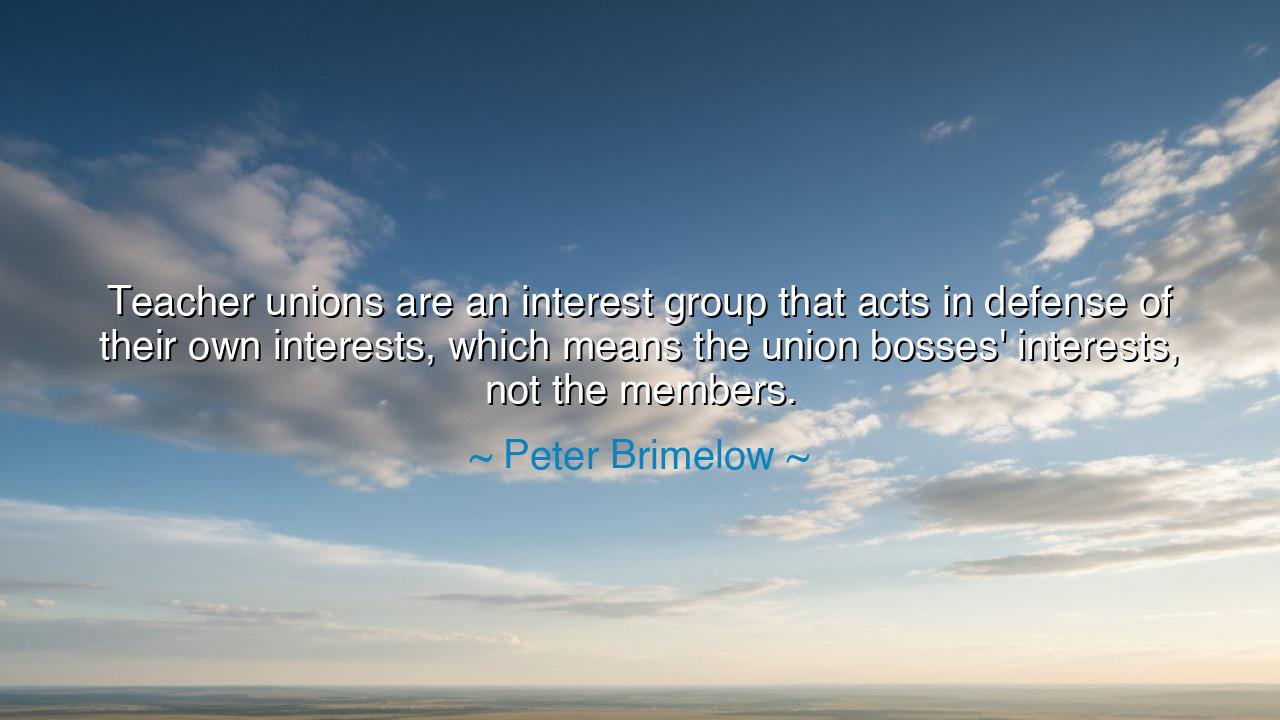
Teacher unions are an interest group that acts in defense of
Teacher unions are an interest group that acts in defense of their own interests, which means the union bosses' interests, not the members.






In the sharp words of Peter Brimelow, there is an accusation that strikes to the heart of power and trust: “Teacher unions are an interest group that acts in defense of their own interests, which means the union bosses’ interests, not the members.” This is no idle remark, but a warning that even institutions founded to protect the noble calling of education may become corrupted by self-preservation. Brimelow’s words reveal a timeless truth: that power, once gained, often serves itself rather than those it was sworn to defend.
To call teacher unions an “interest group” is to strip them of their higher mantle. Teachers are entrusted with guiding the young, planting seeds of wisdom for the generations to come. Their unions, in theory, should safeguard them so that they may carry out this sacred duty with dignity. Yet Brimelow declares that instead of serving the classroom teacher, many unions serve the ambitions of their leaders, the so-called “union bosses.” It is a lament of betrayal—that the shield forged for protection has become a tool of self-gain.
History has shown this pattern again and again. Consider the guilds of medieval Europe, which began as brotherhoods meant to protect craftsmen from exploitation. Over time, many grew rigid, dominated by masters who barred entry to outsiders and grew wealthy while apprentices suffered. What began as defense became control. Likewise, in modern labor struggles, some unions have indeed lifted workers into dignity, while others have calcified into bureaucracies where leaders thrive while the rank and file stagnate. Brimelow’s critique falls into this ancient lineage: the danger of institutions forgetting their first love.
The words also carry a deeper warning about the corruption of power. Even the most righteous cause, when administered poorly, can lose its soul. When leaders become detached from those they represent, the voices of the humble are drowned by the ambitions of the powerful. In the realm of education, this danger is doubly severe, for the neglect of teachers reverberates into the neglect of students. When the interests of leaders outweigh the mission of teaching, not only members suffer, but the very fabric of society weakens, for education is the root of civilization.
Yet, we must not interpret Brimelow’s saying as a condemnation of all collective action. Rather, it is a summons to vigilance. It is a reminder that unions, like all human institutions, must be constantly measured against their true purpose. They must be judged not by the prosperity of their leaders but by the flourishing of their members—the teachers in classrooms, the men and women who daily bear the burden of shaping young minds. Just as rulers must be held accountable to their people, so too must unions be held accountable to their members.
A lesson emerges from this: beware of complacency in the face of authority. Do not assume that organizations act purely for your good, even when they wear noble names. Question, challenge, and demand accountability. If you are a member of such a group, lift your voice and ensure it is heard. If you are a leader, remember that power was given not for your own comfort but for service. The highest honor of leadership is to protect the weak, not to enrich the strong.
In practice, this means three things. First, teachers and workers must remain engaged, not surrendering their voices to bureaucracy. Second, leaders of unions—or any body—must hold themselves to the standard of service, remembering always that their office exists for others, not themselves. And third, society must watch vigilantly, for when institutions fail in their duty, it is often the innocent—the students, the children—who bear the cost.
Thus, Brimelow’s words echo like a stern commandment: “Teacher unions are an interest group… in defense of their own interests, not the members.” Whether or not one agrees with his harshness, the wisdom within is clear—power without accountability strays from its path. Let us take heed, and let every institution, every leader, and every union remember its sacred charge: not to serve itself, but to serve the people it was born to protect.






AAdministratorAdministrator
Welcome, honored guests. Please leave a comment, we will respond soon